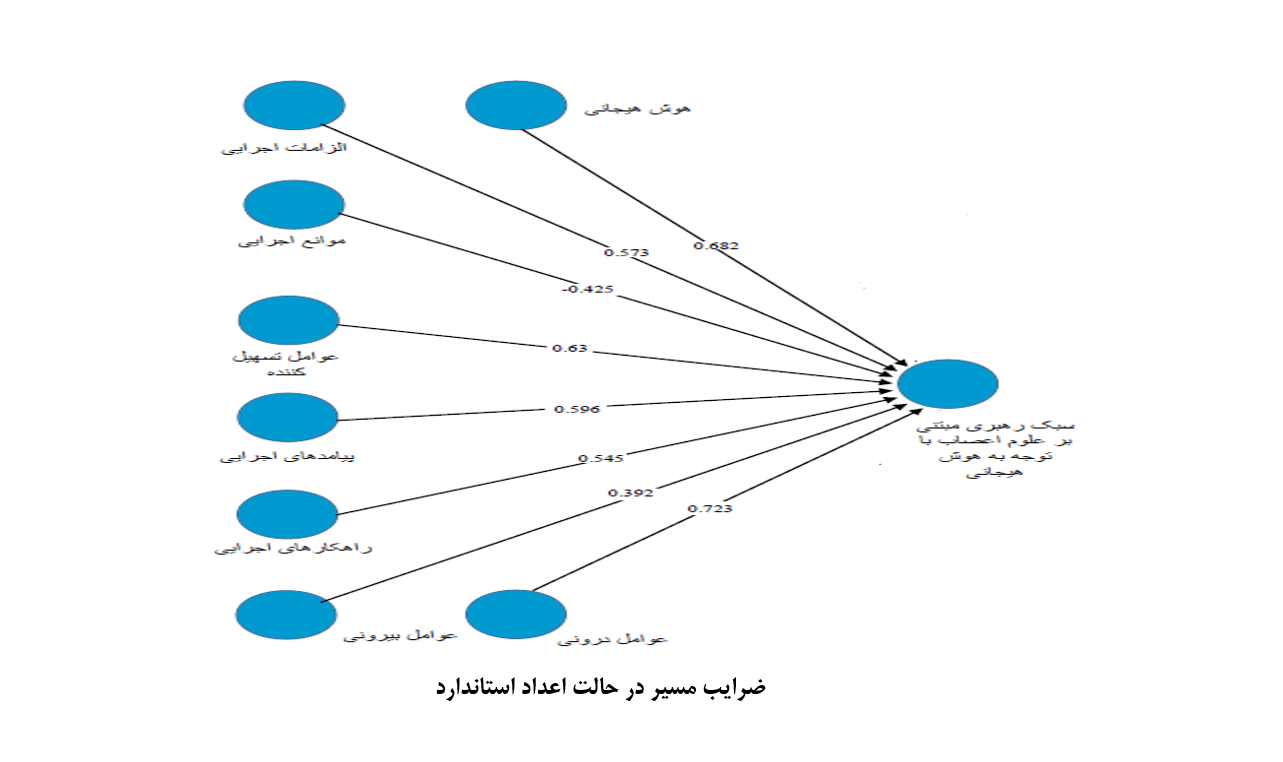اعتبارسنجی مدل انتخاب سبک رهبری از طریق رهبری مبتنی بر علوم اعصاب با توجه به هوش هیجانی در شهرداریهای کلانشهرهای کشور
کلمات کلیدی:
اعتبار سنجی, سبک رهبری, رهبری مبتنی بر علوم اعصاب, هوش هیجانی, شهرداریهای کلانشهرهای کشورچکیده
هدف این پژوهش اعتبارسنجی مدل انتخاب سبک رهبری مبتنی بر علوم اعصاب با توجه به نقش هوش هیجانی در شهرداریهای کلانشهرهای کشور بود. پژوهش حاضر از نظر هدف کاربردی و از نظر روش گردآوری دادهها توصیفی-پیمایشی بود. جامعه آماری شامل مدیران و کارشناسان شهرداریهای کلانشهرها بوده که با استفاده از روش نمونهگیری تصادفی طبقهای ۳۸۴ نفر به عنوان نمونه انتخاب شدند. ابزار پژوهش پرسشنامه محققساخته بود که روایی آن توسط متخصصان و پایایی آن با استفاده از آلفای کرونباخ و پایایی ترکیبی تأیید شد. دادهها با استفاده از مدلسازی معادلات ساختاری و نرمافزار PLS تحلیل شدند. یافتهها نشان داد که تمامی شاخصهای برازش مدل در حد مطلوب بوده و مدل پیشنهادی از اعتبار مناسبی برخوردار است. هوش هیجانی با ضریب مسیر ۰.۶۸۲ و عوامل درونی با ضریب مسیر ۰.۷۲۳ بیشترین تأثیر مثبت را بر سبک رهبری مبتنی بر علوم اعصاب داشتند. همچنین موانع اجرایی با ضریب مسیر ۰.۴۲۵- تأثیر منفی معناداری بر استقرار این سبک رهبری نشان داد. سایر متغیرها شامل الزامات اجرایی، عوامل تسهیلکننده، پیامدهای اجرایی و راهکارهای اجرایی نیز تأثیر مثبت و معناداری بر سبک رهبری داشتند. این پژوهش نشان داد که تلفیق هوش هیجانی و علوم اعصاب میتواند چارچوب نوآورانهای برای توسعه سبک رهبری اثربخش در سازمانهای عمومی ارائه دهد.
دانلودها
مراجع
Haris A, Jones M, Ismail N. Distributed leadership: taking a retrospective and contemporary view of the evidence base. School Leadership & Management. 2022;52(5):438-56. doi: 10.1080/13632434.2022.2109620.
Kan J, editor Research on the relationship between leadership style and team dynamics in high-performance teams. SHS Web of Conferences; 2024.
Pope M. Systematic Review of Head Nurse Leadership Style and Nurse Performance. International Journal of Africa Nursing Sciences. 2020:100564.
Kouravand N. Neuro management and leadership. International Journal of New Findings in Health and Educational Sciences (IJHES). 2024;2(2):1-21. doi: 10.63053/ijhes.68.
Alexander R. The neuroscience of positive emotions and affect: Implications for cultivating happiness and wellbeing. Neuroscience and Biobehavioral Reviews. 2021;121:220-49. doi: 10.1016/j.neubiorev.2020.12.002.
Beard SM. The Concept of Neuroleadership Scarf Domain Theory on the Self-Efficacy and Emotional Intelligence of Executive Leadership: Trevecca Nazarene University; 2021.
Liu CC, Yeh WC, Yu Z, Lin XC. The relationships between leader emotional intelligence, transformational leadership, and transactional leadership and job performance: A mediator model of trust. Heliyon. 2020;9(8).
Axon M, Awwad DA, Lewis SJ, Mackay S, Robinson J. Examining the relationship between emotional intelligence, leadership attributes and workplace experience of Australian chief radiographers. Journal of Medical Imaging and Radiation Sciences. 2020;51(2):256-63. doi: 10.1016/j.jmir.2020.01.002.
Edmie Edison N, Jang D, Elfenbein HA, Porath C. Who succeeds in a leadership course? Achievement is predicted by ability-tested but not self-reported emotional intelligence. Social Sciences & Humanities Open. 2020;8(1):100566. doi: 10.1016/j.ssaho.2023.100566.
Ahmadi Behrouz N. The Effect of Neuroscience-Based Leadership on the Emotional Intelligence of Employees at the Iran Tobacco Company: Allameh Tabataba'i University; 2020.
Kantola JI, Nazir S, Salminen V. Advances in Human Factors, Business Management and Leadership: Springer International Publishing; 2020.
Roda J, Kosuri AD. Neuroleadership in Transforming Educational Leaders. East Asian Journal of Multidisciplinary Research. 2020;2(5):1979-94. doi: 10.55927/eajmr.v2i5.3984.
Juhero M, Olya AM. Sustaining employees' creativity through the organizational justice: The mediating role of leadership styles. Social Sciences & Humanities Open. 2020;8(1):100693. doi: 10.1016/j.ssaho.2023.100693.
Golshani M, Omidi B, editors. A Study of the Impact of Leadership Styles on Knowledge-Sharing Behavior with the Moderating Role of Job Motivation (A Case Study of Tejarat Bank of Ilam). First International Conference on Management, Economics, Entrepreneurship, and Industrial Engineering; 2023; Tehran.
Pour Soltanian H, Ganji Nia H, Azadeh-del MR. Identifying the Dimensions and Components for Choosing a Leadership Style Through Neuroscience-Based Leadership with Attention to Emotional Intelligence in the Municipalities of the Country's Metropolises. Journal of Personal Development and Organizational Transformation. 2024;2(1):96-110. doi: 10.61838/kman.jpdot.2.1.6.
Rangriz H. Designing a Neuroscience-Based Innovative Leadership Model in Iran's Banking Industry. Quarterly Journal of Innovation Management in Defense Organizations. 2023;6(1):33-56.
Oliveira C, Favaretto JER. Leadership Styles and Digital Transformation: A Literature Review. Observatorio De La Economía Latinoamericana. 2025;23(4):e9544. doi: 10.55905/oelv23n4-071.
Ying Z. The Future of Nursing Leadership: Adapting Leadership Styles for Remote Work Environments. International Journal of Research and Innovation in Social Science. 2025;IX(III):2339-51. doi: 10.47772/ijriss.2025.90300182.
Mokhchy J, Chen G, Ahmad S, Khan YA, Zhang J, Ahmed M. Dynamic impact of leadership style, knowledge-sharing, and organizational culture on organizational performance. Current Psychology. 2025;44(6):4097-112. doi: 10.1007/s12144-025-07411-z.
Cui H, Wang J-F. Impact of Leadership Styles on Creative Deviance: Mediating Roles of Feedback-Seeking and Psychological Availability, With Moderating Effects of Achievement Motivation and Learning Climate. Edelweiss Applied Science and Technology. 2025;9(1):1302-31. doi: 10.55214/25768484.v9i1.4404.
Abbasi F, Zarei Matin H, Abbasi H. Identifying the Components of Neuroscience-Based Leadership. Journal of Industrial and Organizational Psychology Studies. 2023;10(1):75-90.
Heydari E, Tehrani M, Moheimani A. The Impact of Neuroscience-Based Organizational Leadership on Employee Training Effectiveness with the Mediating Role of Social Capital in Knowledge-Based Companies. Journal of Social Capital Management. 2023;10(4):369-82.

دانلود
چاپ شده
ارسال
بازنگری
پذیرش
شماره
نوع مقاله
مجوز
حق نشر 2025 Hossein Poursoltaniyan (Author); Hossein Ganjinia (Corresponding author); Mohammad Reza Azadehdel (Author)

این پروژه تحت مجوز بین المللی Creative Commons Attribution-NonCommercial 4.0 می باشد.










